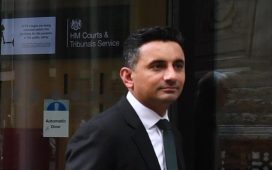On the last day of his life, Francis Williams feared he was about to be sent to prison. Williams, 43, had committed no recent crime but when he was kicked out of a hostel in Bognor Regis after a drinking relapse, he guessed what was coming next.
An arcane sentence for a street robbery 18 years earlier meant homelessness and addiction would be enough to send Williams back inside. He had been given an imprisonment for public protection (IPP) sentence and could be recalled to prison if he was deemed to be a risk, even though he had served his time.
An inquest at Chichester coroner’s court on Tuesday found that his IPP sentence caused or contributed to his death.
When Williams lost his hostel place on 27 January 2023, his worst fears were confirmed: his probation officer said he was facing an emergency recall to prison. He told her in detail how he would end his life if that happened and that police would find a body.
The probation officer alerted Sussex police to his suicide risk but they did not appear to prioritise a search. He was found dead in a tent in a park in Bognor Regis the following day.
Despite IPP sentences being abolished in 2012 after growing outcry over their impact, Williams was one of thousands of people still subject to them because the changes were not backdated.
His sister, Suzanne Rodrigues, told the Guardian: “I know it was the IPP. The system doesn’t provide people on IPP with even a glimmer of hope.”
Last year the number of people still on IPPs who were recalled to prison increased by 8% to 1,625, according to the latest Ministry of Justice figures.
The coroner in Williams’s inquest, Nick Armstrong, is expected to put out a prevention of future death notice later this month warning about the particular psychological pressures on IPP prisoners.
Williams was among the first people to receive an IPP when he was sentenced in 2006. He was in his early 20s, reeling from the grief of losing his aunt and mother, and was having addiction problems.
His recall last year was 12 years after his release from prison for that crime. For the best part of the previous decade, his life had looked more positive: he built a successful business as a fitness coach and was determined to start afresh.
But then his relationship ended after his girlfriend returned to Australia and the travel restrictions of his IPP meant he could not follow her. That and, later, the isolation of the pandemic prompted a downward spiral in his mental health and a return to addiction, exacerbated by the fear of a recall to prison.
Rodrigues, 50, who is his closest surviving relative and works with young people with special needs, said the threat of being snatched back to prison even without committing a crime was “torture” for her brother. She said he was often too scared to seek help with his mental health or addiction in case probation used it against him.
She told the coroner’s court: “The IPP sentence was not a matter of going to prison and doing time but a sentence for life. It made Francis paranoid, isolated and scared to be around other people when he was most vulnerable.”
The last time Williams met his probation officer, he was very agitated on the phone to his sister, who said he told her: “Just like that, with a click of her fingers, my life could be over.”
In the end, his fears were proven right. “The things he was petrified of actually happened on that day,” Rodrigues said. “It’s heartbreaking because the things he was being recalled for were not crimes. Nobody goes to prison if they’re homeless or drunk.”
Rodrigues wants the system to change for those still on IPPs. “It’s like you’re guilty before you’re innocent. You’re going to be punished because of what you might just do … It’s a very unfair, inhumane system.”
Williams’s aunt Susan Range, 67, said IPP was “psychological torture” for him. “He’s paid the ultimate price,” she said.
Philip Rule KC, who represented Williams’s family in court, said: “Francis’s death is yet another avoidable tragedy generated by the failure of parliament or ministers to address the cohort of people given an IPP sentence over a decade ago and who are still living with it.”
Changes announced by the MoJ last year mean those on IPPs who have not reoffended in the last five years will automatically be released from them, but there are many to whom it will not apply, including those still in prison.
The family’s solicitor, Olivia Coffey, of Hodge Jones and Allen, said; “Whilst the IPP sentencing regime has been abolished, there are thousands of individuals presently in the same situation that Francis was – that is, being left with the possibility of indefinite recall to prison whilst trying to move forwards with their lives despite this.
“Sadly, this is not the first time someone has taken their own life when faced with the prospect of being recalled to prison. Without these issues being properly addressed by the Ministry of Justice, it may well not be the last.”
Sussex police said their “sincere condolences go to the family and friends of Francis Williams” and noted that the inquest did not find that their actions had contributed to his death.
An MoJ spokesperson said: “Our thoughts remain with the friends and family of Francis Williams. These sentences are a stain on the justice system, which is why we’ve taken decisive action to curtail licence periods for IPP offenders and give rehabilitated people the opportunity to move on with their lives. We have also improved the mental health support in place for IPP offenders living in the community who are at risk of self-harm or suicide.”










